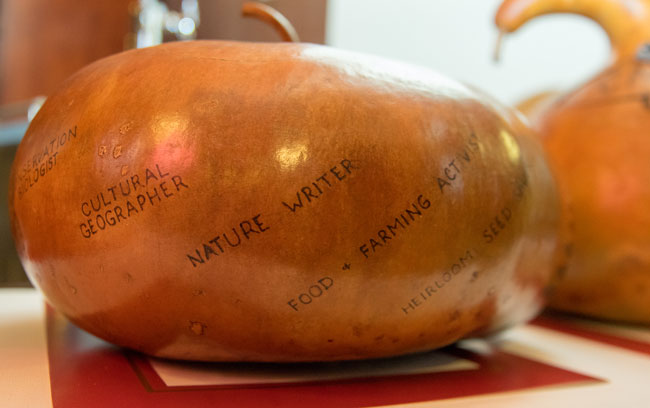
Congratulations to this year's Susties and Justies, honored at EcoFarm's annual Awards Ceremony. The Justie was awarded to Dr. Gail Myers and Winona LaDuke. The Sustie," was awarded to Sally Fox, Gary Nabhan, and Dave Runsten.
The Ecological Farming Association developed the Steward of Sustainable Agriculture ("Sustie") to honor people who have been actively and critically involved in ecologically-sustainable agriculture and have demonstrated their long term, significant contributions to the well-being of agriculture and the planet.
The Advocate of Social Justice ("Justie") award honors outstanding individuals who have been active advocates for social justice as a critical aspect of ecologically-sustainable agriculture and food systems.
Read on to learn what makes this year's awardees so remarkable.
Dr. Gail Myers, "Justie"
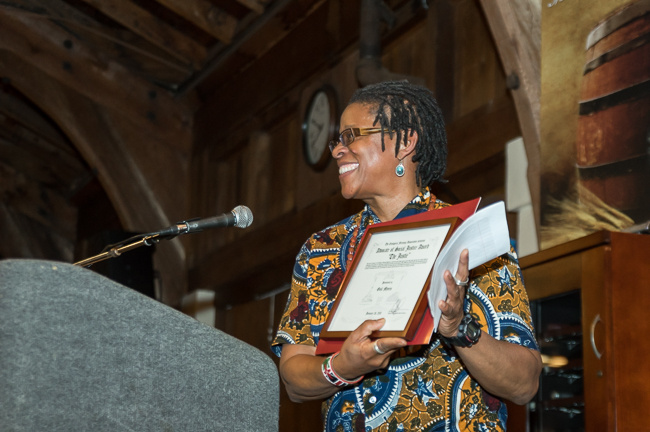
Dr. Gail Myers has spent the better part of two decades as a catalyst for positive change in her local community. An advocate for the socially disadvantaged, she champions sustainable small farms. Dr. Myers is a cultural anthropologist, and has achieved great academic success in her field, earning both a Doctorate and a Masters in Applied Anthropology. A recipient of numerous awards and honors as well as serving in the United States Air Force, Dr. Myers is considered an expert in her field. Today, Dr. Myers is researching, teaching, writing, and creating documentaries to showcase and highlight the adaptations and sustainable practices of African American Farmers.
In 2001, Dr. Myers organized the first statewide conference for African American Farmers in Ohio, and has gone on the serve as the conference coordinator. More recently in 2013, Dr. Myers helped facilitate, along with local community stakeholders and farmers, the Freedom Farmers’ Market in West Oakland. A market focused on connecting African American Farmers with communities in need.
Currently, she lives and works in Oakland, CA as the manager for Farms to Grow, Inc. a 501(c)3 dedicated to working with African American farmers and under-served sustainable farmers. FTGI is committed to sustainable farming and innovative agricultural practices which preserve the diversity and ecological balance of the local environment. FTGI aims to increase the capacity of underserved farmers to keep their farm operations and establish farming as a viable career alternative for future generations.
Winona LaDuke, "Justie"
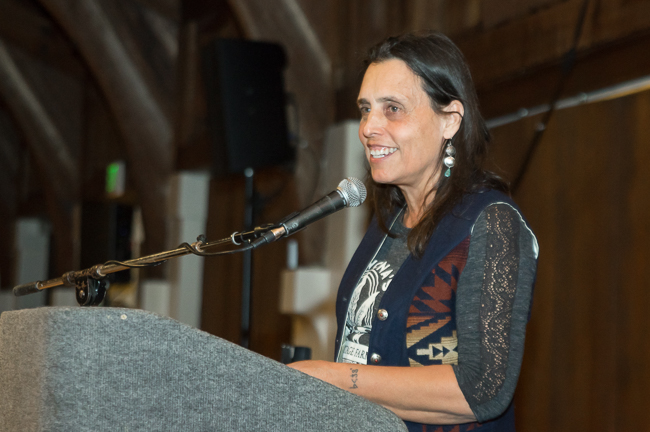
Winona LaDuke is an environmental and social justice activist and a tireless advocate for indigenous people’s rights around the world. The international activism of this Justie began at the age of 18, with a trip to Geneva, Switzerland to explain to United Nation leaders the long history of cultural and economic discrimination suffered by indigenous people. This experience planted the seeds for a lifetime of activism that would follow.
After receiving an economics degree from Harvard, LaDuke moved to the White Earth Indian Reservation in Minnesota and committed herself to understanding the root causes of economic hardship in Native communities, like her own Ojibwe Nation. Together with musicians from the Indigo Girls, she founded the non-profit organization, Honor the Earth, on the White Earth Reservation. Their mission is to break the geographical and political isolation of Native communities, increase their financial resources, and empower and mobilize them to protect their land and way of life.
This awardee also founded the White Earth Land Recovery Project, which revives and protects native seeds, heritage crops, fruit, animals, and wild plants. The Project won the Slow Foods Award for Biodiversity in recognition of their work to protect wild rice from patenting and genetic engineering.
She was the two-time Vice Presidential Candidate for the Green Party, with Ralph Nader who ran for President in 1996 and 2000.
Some of this Justie’s other notable accomplishments and awards include founding the Indigenous Women’s Network, which empowers indigenous women to participate in political, social and cultural change. She was named Ms. Magazine’s Woman of the Year along, with the Indigo Girls. She received the Reebok Human Rights award, and is an inductee into the National Women’s Hall of Fame.
Winona LaDuke has led successful grassroots organizing campaigns to halt uranium mining on Native lands and the transport dumping of nuclear waste on Reservations. She participated in a 5 year battle against Enbridge Tar Sands pipelines and won, but other pipelines have come along since. As a coordinator at Standing Rock, she worked with the Sioux Tribe and supporters to protect their drinking water and ancestral lands from the Dakota Access pipeline.
LaDuke has authored over 16 books and countless articles and editorials. She farms beans, corn, squash and most recently, hemp for fiber.
Sally Fox, "Sustie"
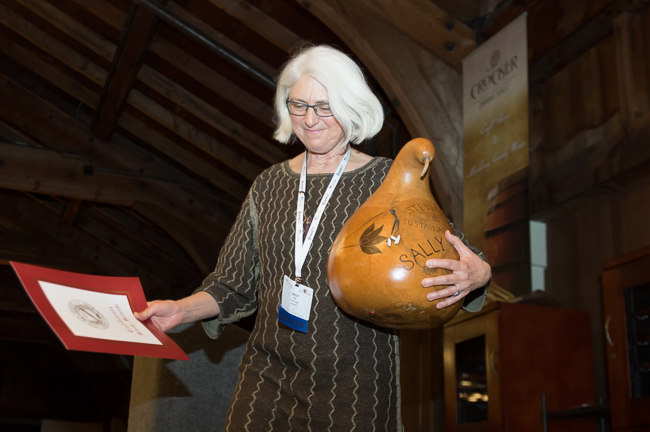
Sally Fox is a true organic pioneer. Sally began leasing land and farming cotton breeding plots in the early 1980's when there were no organic cotton farmers. To breed cotton that grows in color organically, one needs to be able to grow up generation after generation of offspring of the seeds made from cross pollinating individual plants (classical plant breeding); then select the individual plants which thrive under the organic conditions; plant those; and keep doing this selection work until a self pollinating, stable variety is developed. This can take 7-25 years. This sort of research does not pay for itself, so Sally funded it by living frugally and putting all her money and free time into it. Once the organically grown, natural colored cotton took off, all proceeds from the sales of commercially viable varieties went into this research and development. Sally introduced the first commercially acceptable colored cotton in the US and created a hit in the 90’s with clothing companies.
Unfortunately, the commercial cotton growers did not take kindly to her work, so Sally had to move a few times. The growers of all white, one variety cotton, “didn’t cotton” to this upstart woman growing colored cotton in a man’s world. Sally moved from Kern County to Western Arizona and then finally to the Capay Valley, searching for the best situation to continue her cotton breeding program - without harassment from the Good Ol’ Boy cotton community. Each farm was transitioned from conventional to certified organic. As Sally settled in the Capay Valley in the late 1990’s she decided to not stop at organic certification, but to reach for the almost mythical biodynamic status. And since animals are a critical part of the biodynamic equation, she agreed to take on Bill and Helga Olkowski's very fine, colored wool merino sheep, that had been organic since the mid '80's.
The year Sally began tending the sheep, she began to grow Sonora heirloom wheat. This annual landrace has the root system of a perennial with very flavorful grains, just very few of them compared to modern wheats. But it was the flavor that got her growing it, year after year, along with the idea that she was sequestering significant carbon via those copious roots, plus, the sheep could eat the stubble.
Finances and water permitting, Sally grows organic cotton, breeding plots and seed increases. The cotton is intercropped with black eyed peas, milo and lots of other fun plants. Sally always enjoying what happens when the plants put on a party, and she gets to attend as matchmaker.
Gary Nabhan, "Sustie"
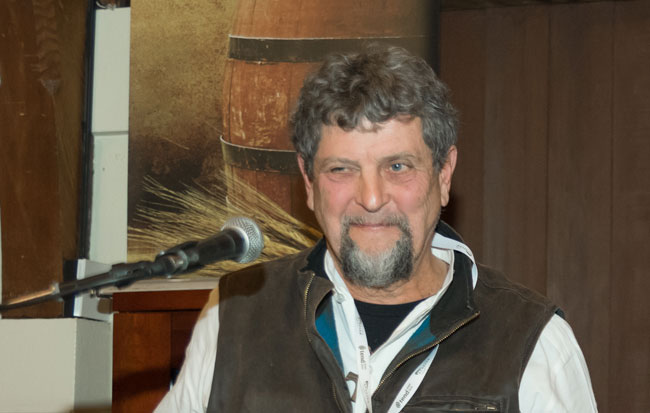
Gary Paul Nabhan, naturalist, author, and social advocate from Patagonia, Arizona, is the Co-founder of the Tucson-based Native Seeds-SEARCH conservation program, the first non-profit conservation organization working to train Native American youth in farming, preserve indigenous southwestern agricultural plants as well as knowledge of their uses (1982-1993) and the Center for Sustainable Environments at Northern Arizona University in Flagstaff, Arizona. He served as director of science at the Arizona-Sonora Desert Museum (1993-2000), before becoming founding director of the Center for Sustainable Environments at Northern Arizona University in Flagstaff, AZ (2000-2008). In 2008 he moved back south to Tucson and joined the University of Arizona faculty as a research social scientist with the Southwest Center, where he now serves as the Kellogg Endowed Chair in Southwestern Borderlands Food and Water Security. He founded the Center for Regional Food Studies there and catalyzed Tucson’s efforts to become the first UNESCO-designated City of Gastronomy in the U.S. In addition, he farms a diverse set of heirloom fruit and nut varieties from the Spanish Mission era and from the Middle Eastern homelands of his Lebanese ancestors, as well as psychotropic plants adapted to arid climates.
The unifying theme of Nabhan’s work is how to have fun while working to avert the impoverishment and endangerment of ecological and cultural relationships, and while celebrating the traditional ecological knowledge of the agrarian communities. He has played a catalytic role in the multicultural, collaborative conservation movement, being one of the co-authors of its populist manifesto, “An Invitation to the Radical Center”. Nabhan was among the first creative non-fiction writers to link the loss of biodiversity to the loss of cultural diversity. In his book with Stephen Trimble, The Geography of Childhood, he was among the first popular writers to show concern with the loss of children’s access to the natural world. He has been a significant contributor in calling attention to the environmental issue of pollinator decline. He founded the Forgotten Pollinators Campaign, the Migratory Pollinators Conservation Initiative, and attempts to restore nectar corridors for pollinators in bi-national watersheds around his home in Patagonia, Arizona.
Gary has authored over twenty books, many receiving high praise and honors including a MacArthur Fellowship, a Lannan Award and a Burroughs Medal, given in in 1986. Called a true prophet of biodiversity and conservation leader, he is an expert advocate for native pollinators, human nourishment, cooperation and social change embodied in the social initiative described in the 2003 publication Forging A West That Works: Invitation To The Radical Center, gathered by the Quivira Coalition.
Dave Runsten, "Sustie"
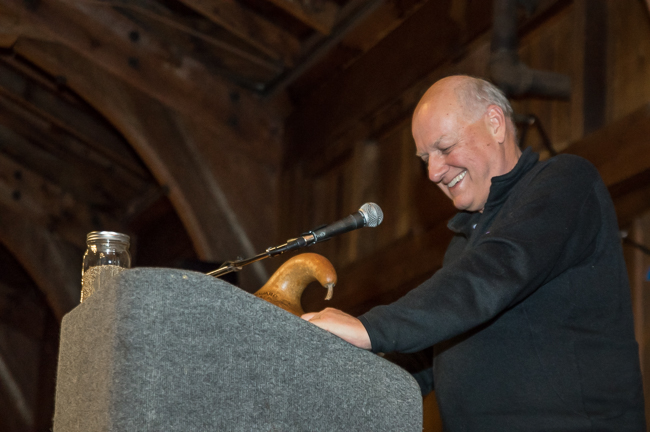
It is not an overstatement to say that Dave has made it his life’s work to “nurture healthy, just and ecologically sustainable farms." Growing up in Modesto and spending many years in Mexico as a graduate student, Dave has developed an exceptionally deep understanding of California Agriculture and the dynamics of farm labor and rural economic development. His training from Stanford University and U.C. Berkeley is in Agricultural and Resource Economics, but his abiding interests and commitments are far from academic. He has been actively engaged for more than three decades in the issues of economic justice, protection of agricultural land resources and creating a level playing field for all California farms. In his current position as Policy Director at CAFF, Dave has focused successfully on promotion of Community Supported Agriculture, urban gardens, farmland preservation and environmental farming. In these efforts, his attention has always been focused on overcoming the unfortunate reality that policy development in Sacramento and Washington D.C. is often stacked against those who have fewer resources to make their case in the halls of power.
Dave has spoken up tirelessly against the rules on farm and produce “food safety” that create expensive and unnecessary hoops for farms to jump through, especially because those rules often fly in the face of organic practices. Dave was a leader in the grassroots effort that successfully made significant improvements in the federal Food Safety Modernization Act. He continues to lead programs that provide technical assistance to farmers as they create reasonable and practical farm food safety plans. Taking this grassroots work to the national level, Dave has been a co-chair of the Food Systems Integrity Committee of the National Sustainable Agriculture Coalition (NSAC) since it’s creation, and represents California agriculture as a member of the executive committee of NSAC. This work to protect family and organic farms from unreasonable “food safety” rules has taken Dave up and down the state of California, testifying before the Cantaloup Board, advocating to CDFA about implementation of the California Leafy Green Products Handler Marketing Agreement, and participating in hearings in Sacramento.
Dave was a co-founder of the California Climate and Agriculture Network and now a member of the Executive Committee; a member of the California Roundtable on Agriculture and the Environment; the California Roundtable on Water and Food Supply; the Coordinating Council of the Stewardship Index for Specialty Crops; part of the review committee for the statewide U.C. Sustainable Agriculture Research and Education Program and a member of the Steering Committee of the Rodale Institute Organic Farmers Alliance. In his work with CalCAN, he was part of a small group that met with the California Strategic Growth Council and was instrumental in increasing funding for farm land preservation from $5 million to $40 million.
Prior to 2005 when he began his work with CAFF he did significant research on farmworkers, including as the Associate Director of the North American Integration and Development Center. Research included studies of indigenous farmworkers; the impacts of the North American Free Trade Agreement; possibilities of creating micro-finance institutions in rural areas; and impacts of Mexican immigration and remittances. While living in Los Angeles (1998 - 2005), Dave worked with the L.A. Alliance For a New Economy, promoting a living wage. He also spent several years working with 2005 Justie Award winner Don Villarejo at the California Institute for Rural Studies.
Photography Credit: Trav Williams, Broken Banjo Photography
